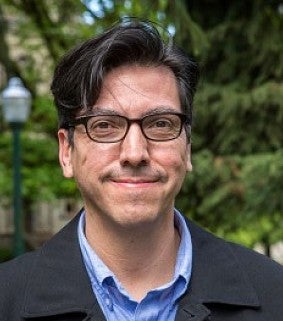Faculty bio | 541-346-9141 | X / Twitter
Biography:
Christopher Chávez is an academic expert in media studies and how it relates to popular culture, advertising and issues of race and ethnicity. Chris’ research focuses on marginalized communities. He has written extensively about the lack of Latinos in music, television and film and LGBTQ targeted advertising. In the past, Chris has commented on the Cover Oregon campaign, how advertisers are dealing with the legalization of marijuana, and changing television practices.
Recent Media:
- Negative political advertising impacts the American people (KCBS, Feb. 17, 2024)
- Los Emmy cumplen 75 años: del bum de la televisión o el modelo por cable al ‘streaming’ (El Argüeño, Jan. 24, 2024)
- A cheery limited time offer: What makes for a memorable holiday commercial (Air Talk, Nov. 29, 2023)
- Masculinity’s evolution: How is it changing from its more traditional sense in society & media (Air Talk, Aug. 9, 2023)
- 10 true crime shows you might have missed (OZY, Feb. 14, 2023)
- Why is TV suddenly obsessed with con stories? (Paste Magazine, March 24, 2022)
- What diversity looks like on public radio: Christopher Chávez explores how NPR could be reimagined to serve everyone (Nieman Lab, Feb. 17, 2022)
- When one way of speaking dominates, who gets to tell their stories on public radio? (Current, June 25, 2020)
- Super Bowl Fun Facts – The Big Game By The Numbers (Wallet Hub, Jan. 27, 2020)
- Right-Wing Views for Generation Z, Five Minutes at a Time (The New York Times, Jan. 4, 2020)
- Community conversation: Racism, hate, Oregon's history and the media (KLCC, Sept. 23, 2019)
- Argentina’s history has sinister echoes in America today (The Register-Guard, Aug. 5, 2018)
- Why America’s public media can’t do its job (The Conversation, May 2, 2017)
- Where were the Latinos at South by Southwest? (The Conversation, April 1, 2015)
- UO School of Journalism hosts Charlie Hebdo discussion (KLCC, Jan. 14, 2015)
- Legal pot takes another step toward mainstream in Stephen Colbert pistachio ad (KIRO Radio, June 12, 2014)
- Oregon to spend $28 million to raise awareness of health exchange (Oregon Public Broadcasting, Sept. 20, 2013)


